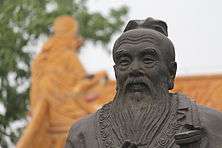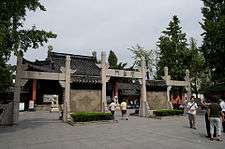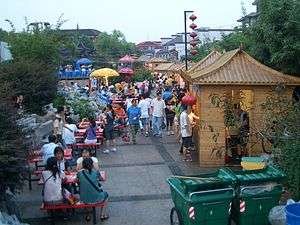Nanjing Fuzimiao
| Nanjing Fuzimiao | |
|---|---|
|
Native name Chinese: 南京夫子廟 | |
|
Confucius Temple in Nanjing Quebec Court of light, also known as Kuixing Court, Man Star Court. | |
| Location | 128 Zinyhan Road, Nanjing, China |
| Coordinates | 32°01′21″N 118°47′02″E / 32.022579°N 118.783786°ECoordinates: 32°01′21″N 118°47′02″E / 32.022579°N 118.783786°E |
| Built | 1034 originally A.D.; the current structure was built in the 19th century |
Nanjing Fuzimiao (Chinese: 南京夫子廟) or Fuzimiao (Chinese: 夫子廟; literally: "Confucian Temple"), is located in southern Nanjing City on banks of the Qinhuai River. Within the area are cultural attractions, arts, shopping, and entertainment.
History
In first year of Jianwu reign of Jin Dynasty (CE 317), Nanking Imperial University was founded, initially on northern bank of Qinhuai River, and in the 3rd year of Xiankang (CE 337) the campus extended to southern bank. Temple of Confucius was firstly constructed in the national school in the 9th year of Taiyuan (CE 384). The place was later destroyed. In the 1st year of Jingyou during Song Dynasty (CE 1034), Confucius Temple was newly constructed on former site of imperial university, and was called Fuzimiao area along with Nanking Fuxue.[1][2] The place became Imperial University again in 1365 in the early year of Ming Dynasty, and sixteen years later recovered to be the campus of Fuxue. During Qing Dynasty, there were two Xianxue (county schools of Shangyuan and Jiangning) in Fuzimiao area. In the end of Qing a primary school jointly sponsored by counties of Nanjing (Jiangning Fu) was established there. The current buildings date from the 19th century, in Qing Dynasty, with additions made since then. The temple lost all financial support by the state as a result of the revolution of 1911. During the late 1920s to 1931 and again in 1932 it was used as army barracks for troops the KMT regime and left in a dilapidated state. Some halls were used as picture gallery.[3] In 1985 Fuzimiao area was restored.
There is Jiangnan Gongyuan near Fuzimiao Temple. It's the largest imperial examination hall in Ming and Qing dynasties.
Throughout its history, the temple along with the around area has been a place for study of Confucianism. There is a small exhibit of folkart within the temple.[4]
 |  |
 | |
Clockwise from top left:
| |
 Streetview north of Zhonghua Gate
Streetview north of Zhonghua Gate Riverside near Fuzi Miao
Riverside near Fuzi Miao Night view of Qinhuai River and Fuzimiao
Night view of Qinhuai River and Fuzimiao
References
| Wikimedia Commons has media related to Fuzi Miao. |
- ↑ Fuzimiao
- ↑ Nanjing Fuzimiao
- ↑ Krug, Hans Joachim (*1893); Wanderungen und Wandlungen in China; Berlin 1941 (Scherl), p. 44-5, 53 (based on a visits 1930-3)
- ↑ DK Eyewitness Travel Guide: China. DK Publishing; 1 June 2012. ISBN 978-0-7566-9328-2. p. 222.

